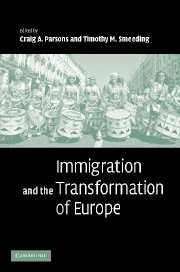Crossref Citations
This Book has been
cited by the following publications. This list is generated based on data provided by Crossref.
Citrin, Jack
and
Sides, John
2008.
Immigration and the Imagined Community in Europe and the United States.
Political Studies,
Vol. 56,
Issue. 1,
p.
33.
Hernandez, Donald J.
Denton, Nancy A.
and
Macartney, Suzanne E.
2008.
CHILDREN IN IMMIGRANT FAMILIES: LOOKING TO AMERICA’S FUTURE.
Social Policy Report,
Vol. 22,
Issue. 3,
p.
1.
Callan, Tim
Smeeding, Tim
and
Tsakloglou, Panos
2008.
Short‐run distributional effects of public education transfers to tertiary education students in seven European countries.
Education Economics,
Vol. 16,
Issue. 3,
p.
275.
Asri, Farid El
2009.
L’expression musicale de musulmans européens. Création de sonorités et normativité religieuse.
Revue européenne des migrations internationales,
Vol. 25,
Issue. 2,
p.
35.
Welply, Oakleigh
2010.
Language difference and identity in multicultural classrooms: the views of ‘immigrant‐background’ children in French and English primary schools.
Compare: A Journal of Comparative and International Education,
Vol. 40,
Issue. 3,
p.
345.
Kokkonen, Andrej
Esaiasson, Peter
and
Gilljam, Mikael
2010.
Ethnic Diversity and Democratic Citizenship: Evidence from a Social Laboratory.
Scandinavian Political Studies,
Vol. 33,
Issue. 4,
p.
331.
Douglass, John Aubrey
and
Thomson, Gregg
2010.
The Immigrant's University: A Study of Academic Performance and the Experiences of Recent Immigrant Groups at the University of California.
Higher Education Policy,
Vol. 23,
Issue. 4,
p.
451.
Leyendeckera, Birgit
Jäkel, Julia
Kademoğlu, Sinem Olcay
and
Yagmurlu, Bilge
2011.
Parenting practices and pre-schoolers’ cognitive skills in Turkish immigrant and German families.
Early Child Development and Care,
Vol. 181,
Issue. 8,
p.
1095.
Devitt, Camilla
2011.
Varieties of Capitalism, Variation in Labour Immigration.
Journal of Ethnic and Migration Studies,
Vol. 37,
Issue. 4,
p.
579.
Freeman, Gary P.
and
Tendler, Stuart M.
2012.
Oxford Handbook of the Politics of International Migration.
p.
324.
Nolan, Brian
2012.
Realizing the Potential of Immigrant Youth.
p.
413.
Smeeding, Timothy M.
Robson, Karen
Wing, Coady
and
Gershuny, Jonathan Israel
2012.
Realizing the Potential of Immigrant Youth.
p.
63.
Sandu, Adriana
2013.
Transnational Homemaking Practices: Identity, Belonging and Informal Learning.
Journal of Contemporary European Studies,
Vol. 21,
Issue. 4,
p.
496.
DeWaard, Jack
2013.
Compositional and Temporal Dynamics of International Migration in the EU/EFTA: A New Metric for Assessing Countries’ Immigration and Integration Policies.
International Migration Review,
Vol. 47,
Issue. 2,
p.
249.
Yoshikawa, Hirokazu
Kholoptseva, Jenya
and
Suárez‐Orozco, Carola
2013.
The Role of Public Policies and Community‐Based Organizations in the Developmental Consequences of Parent Undocumented Status and commentaries.
Social Policy Report,
Vol. 27,
Issue. 3,
p.
1.
Hermansen, Are Skeie
2013.
Occupational Attainment Among Children of Immigrants in Norway: Bottlenecks into Employment––Equal Access to Advantaged Positions?.
European Sociological Review,
Vol. 29,
Issue. 3,
p.
517.
López González, Alejandro
and
Aldrey Vázquez, José Antonio
2014.
Inmigración y distribución de la población anciana en España (2002-2011): una aproximación desde la escala municipal.
Estudios Geográficos,
Vol. 75,
Issue. 277,
p.
619.
Kokkonen, Andrej
Esaiasson, Peter
and
Gilljam, Mikael
2014.
Migration‐based Ethnic Diversity and Social Trust: A Multilevel Analysis of How Country, Neighbourhood and Workplace Diversity Affects Social Trust in 22 Countries.
Scandinavian Political Studies,
Vol. 37,
Issue. 3,
p.
263.
Smeeding, Timothy M.
2014.
Adjusting to the fertility bust.
Science,
Vol. 346,
Issue. 6206,
p.
163.
Favell, Adrian
2016.
Just like the USA? Critical notes on Alba and Foner’s cross-Atlantic research agenda.
Ethnic and Racial Studies,
Vol. 39,
Issue. 13,
p.
2352.





